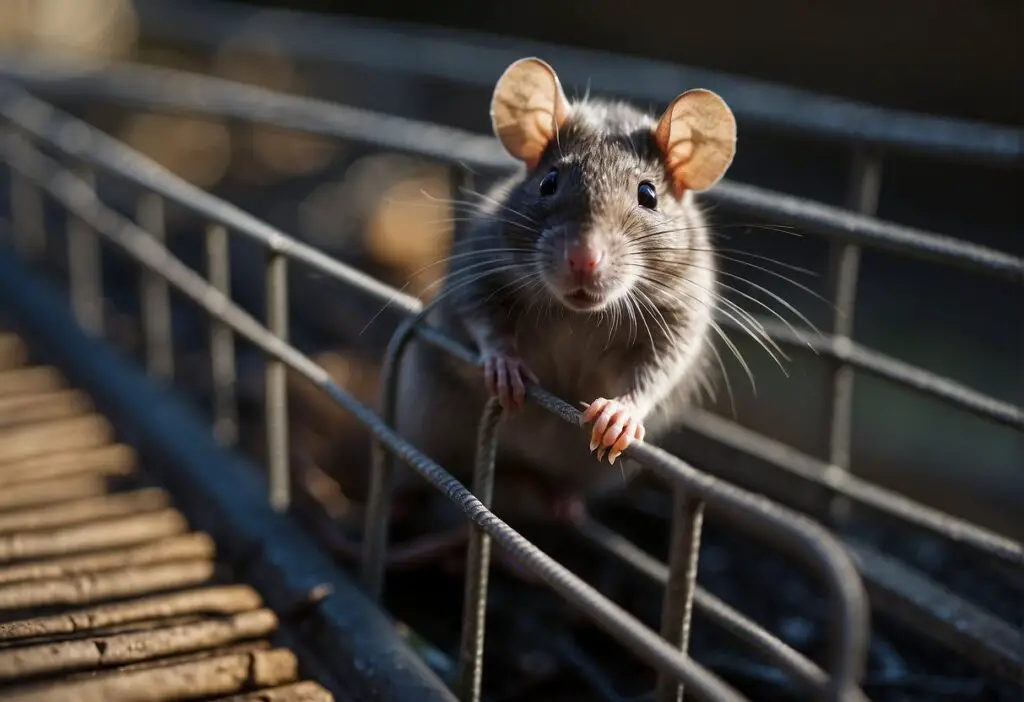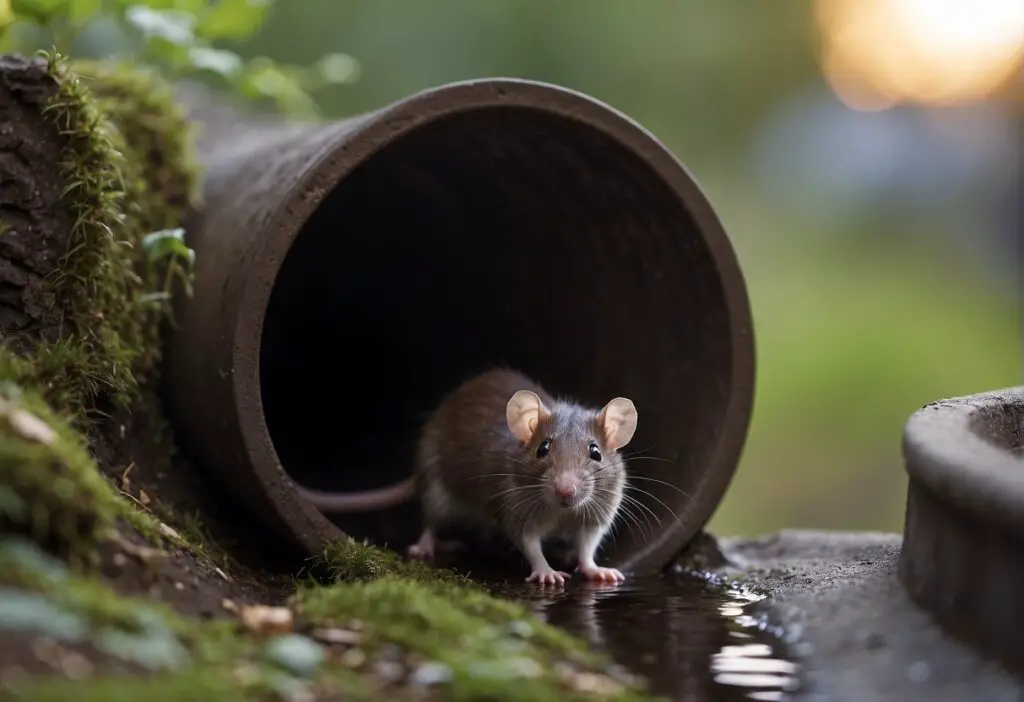Are you tired of finding rats in your toilet or sink?
Rats can climb up drain pipes and invade your property without warning. They can enter your home through holes in the walls, under the flooring, and even your drainage system. However, there are ways to prevent rat infestation and keep your home rodent-free.

One way to stop rats from climbing drain pipes is to install a rat blocker. Rat blockers are devices that prevent rats from entering your drainage system. They work by allowing water and waste to flow out of your property but blocking rats from entering. Rat blockers are easy to install and can be fitted to most types of drain pipes. By installing a rat blocker, you can prevent rats from using your drain pipes as a gateway to your property.
Another way to stop rats from climbing drain pipes is to keep your drains clean and free from debris. Rats are attracted to food waste, fat, grease, and oil, which can build up in your drains and provide a food source for rats. To prevent this, avoid pouring food waste down your kitchen sink and maintain your drains regularly by checking for leaks and damaged pipes. By keeping your drains clean and well-maintained, you can reduce the risk of rat infestation in your home.
Understanding Rat Behavior
If you’re dealing with rats climbing up your drain pipes, it’s important to understand their behavior. This will help you come up with effective solutions to keep them out of your home. Here are some key things to know about rats:
Anatomy of Rats
Rats have sharp claws that allow them to climb up walls and pipes with ease. They also have long tails that help them balance as they climb. Rats are excellent climbers and can climb vertically up rough surfaces, such as brick walls, without any trouble. They can even climb up pipes that are several inches in diameter.
Rats in Urban Areas
Rats are common in urban areas where there is plenty of food and shelter available. They are attracted to garbage, compost, and pet food, and will often make their homes in attics, basements, and crawl spaces. If you live in an urban area, it’s important to keep your home clean and free of clutter to discourage rats from making themselves at home.
To prevent rats from climbing up your drain pipes, you can install rat blockers or use metal flashing to cover the pipes. You can also make sure there are no openings or gaps around your pipes that rats can use to climb up. By understanding rat behavior and taking steps to prevent them from getting into your home, you can keep your home rat-free and avoid the damage and disease that they can cause.
Identifying the Problem

Rats are a common problem in many households, and it’s important to identify the problem early on to prevent further infestation. In this section, we’ll discuss the common signs of rat infestation and the most common entry points for rats.
Signs of Rat Infestation
The first step in identifying a rat infestation is to look for signs of their presence. Rat droppings are one of the most common signs, and they are usually found near food sources or in areas where rats are likely to travel, such as along walls or in corners. Rat droppings are small, black, and shaped like a grain of rice.
Another sign of a rat infestation is gnaw marks on food containers, wires, and other objects. Rats have strong teeth and can chew through almost anything, so look for holes or cracks in walls, floors, and ceilings.
Finally, listen for scratching or scurrying sounds in the walls or ceiling. Rats are nocturnal creatures, so you’re more likely to hear them at night.
Common Entry Points
Rats can enter your home through a variety of entry points, so it’s important to seal up any holes or cracks in your walls, floors, and ceilings. Common entry points include:
- Holes or cracks in walls, floors, and ceilings
- Openings around pipes and vents
- Gaps around doors and windows
- Gaps around the roofline
- Openings around utility lines and cables
To prevent rats from climbing up your drain pipes, make sure to cover any openings with wire mesh or other barriers. You can also use metal collars to prevent rats from climbing up the pipes.
By identifying the signs of a rat infestation and sealing up common entry points, you can prevent rats from entering your home and causing further damage.
Preventative Measures
If you want to prevent rats from climbing your drain pipes, there are several measures you can take to ensure the rodents stay out of your drainage system. Here are some of the most effective preventative measures:
Securing Drain Pipes
One of the most effective ways to prevent rats from climbing your drain pipes is to secure them. This can be done by installing cages or barriers around the pipes to prevent the rats from gaining access. You can also install one-way valves to prevent rats from entering your home through the drainage system. Additionally, you can seal your drainage system to prevent rats from entering through small gaps or holes.
Installing Barriers
Another way to prevent rats from climbing your drain pipes is to install barriers. This can be done by installing grating or covers over your drains to prevent rats from entering. You can also install flaps or guards over your drains to prevent rats from climbing up the pipes.
Regular Maintenance
Regular maintenance is also important in preventing rats from climbing your drain pipes. This includes checking your drains for leaks or damage, and repairing any issues as soon as possible. Additionally, you should avoid pouring food waste, fat, grease, and oil down your kitchen sink as these can provide a food source for rats and lead to drain blockages.
By taking these preventative measures, you can effectively prevent rats from climbing your drain pipes and entering your home through the drainage system. Regular maintenance and attention to detail are key in ensuring that your drainage system remains rat-free.
Practical Solutions
If you’re dealing with rats climbing your drain pipes, there are several practical solutions you can try to stop them from doing so. Here are two effective methods:
Physical Modifications
One way to stop rats from climbing drain pipes is to make physical modifications to the pipes themselves. For example, you can install a rat flap blocker on your pipes. This is a device that allows water to flow out of the pipes, but prevents rats from climbing up into them. Rat flap blockers are available for pipes made of iron, PVC, and clay. They are easy to install and can be a very effective way to prevent rats from entering your home.
Another physical modification you can make is to install an inner finned pipe. This type of pipe has small fins on the inside that make it difficult for rats to climb up. Inner finned pipes are available for both PVC and clay pipes.
Chemical Deterrents
Another way to stop rats from climbing drain pipes is to use chemical deterrents. One option is to use poisons that are specifically designed to kill rats. However, this method can be dangerous and should only be used as a last resort.
Another option is to use bleach. Pouring bleach down your drain pipes can help deter rats from climbing up them. However, it is important to use bleach carefully, as it can be harmful to both humans and pets.
A diverter leaf collector is also an effective way to prevent rats from climbing up your drain pipes. This device is designed to catch leaves and other debris before they enter your pipes. By preventing debris from entering your pipes, you can make it more difficult for rats to climb up them.
In conclusion, there are several practical solutions you can try to stop rats from climbing your drain pipes. By making physical modifications to your pipes and using chemical deterrents, you can help keep rats out of your home.
Professional Assistance

If you have tried all the DIY methods to stop rats climbing drain pipes and they still keep coming back, it may be time to call in the professionals. In this section, we’ll discuss when to call experts and the benefits of professional services.
When to Call Experts
If you have a rat infestation in your home, it’s important to act fast. Rats can carry diseases and cause damage to your property. If you have tried all the DIY methods and the problem persists, it’s time to call in the experts. Pest control companies and local authorities can help you get rid of the rats and prevent them from coming back.
If you’re a tenant, it’s important to contact your landlord as soon as possible. They may have a pest control company they work with, or they may be able to provide you with advice on how to deal with the problem. If you own your home, you can contact a pest control company or a professional plumber to help you.
Benefits of Professional Services
Professional pest control companies and plumbers have the experience and knowledge to deal with rat infestations. They have access to specialized equipment and products that are not available to the general public. They can also provide you with advice on how to prevent future infestations.
When you hire a professional, you can be sure that the problem will be dealt with effectively and efficiently. They will identify the source of the problem and take steps to eliminate it. They will also take steps to prevent the rats from returning.
In addition, hiring a professional can save you time and money in the long run. If you try to deal with the problem yourself and it persists, you may end up spending more money on DIY methods than you would have on professional services.








